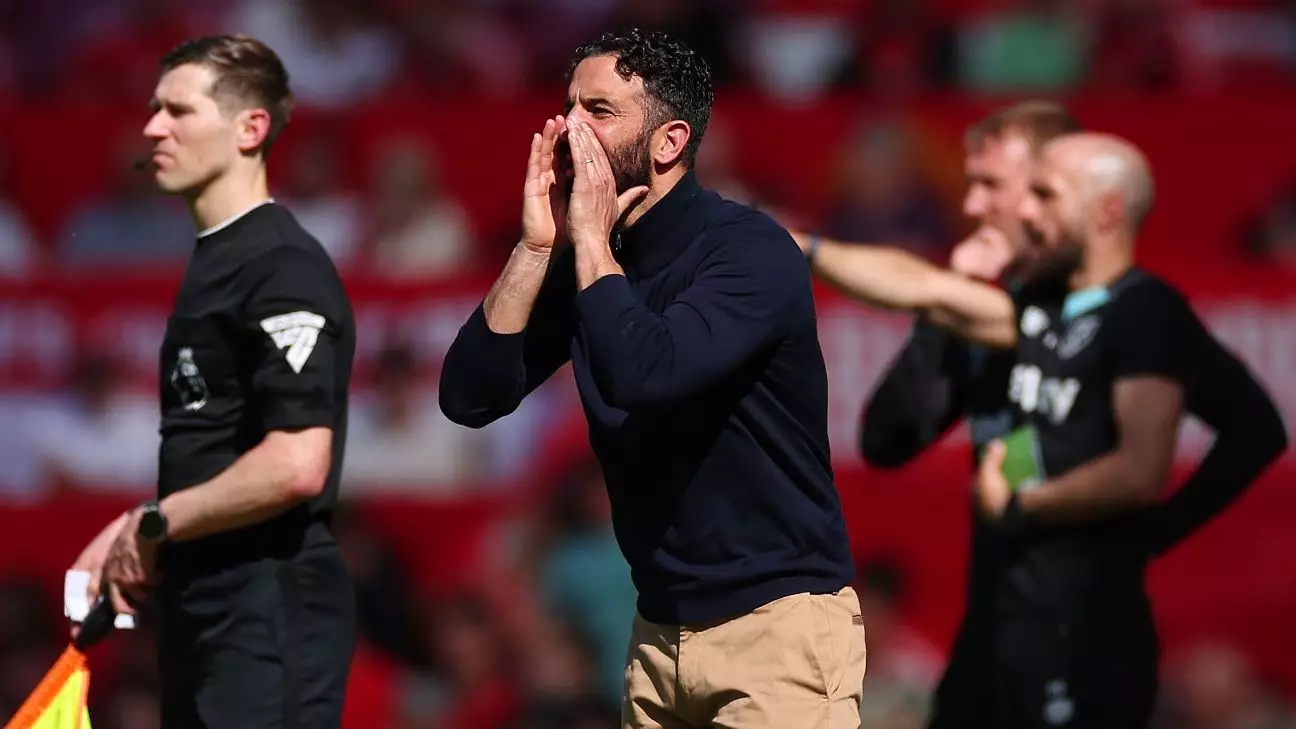As Manchester United continues to grapple with its troubling Premier League performance, the burden of expectations has increasingly devolved upon the shoulders of its manager, Ruben Amorim. Following a disheartening 2-0 defeat to West Ham, Amorim openly questioned his own role in leading this historic team forward. The club currently sits perilously low in the league standings, a concern that not only reflects on Amorim’s managerial abilities but also raises alarms about the wider atmosphere surrounding the squad.
Amorim’s candidness during the post-match conference shed light on the emotional turmoil that accompanies such a dismal season. His straightforward admission of “embarrassment” encapsulates not merely personal disappointment, but a sense of obligation felt by everyone at the club. One could argue that this moment signifies more than just a failing team; it highlights a culture that has drifted from the lofty standards that once defined Manchester United. It’s in moments like these that the essence of leadership comes into play—what do you do when the machine you manage is sputtering and choking?
A Fight for Identity
What is becoming increasingly clear is that Manchester United is at risk of losing its identity. Amorim’s comments about the acceptance of mediocrity raise critical questions about the mindset prevailing among the players. The notion that a defeat at home can be brushed off as “OK” sends shockwaves through the club’s ethos. In a setting where victories were celebrated as the norm and losses were met with outrage, the current apathy represents a departure from the club’s core philosophy. This is more than just a tactical issue; it is a deeply rooted psychological dilemma.
Amorim’s self-reflection demonstrates different shades of responsibility. He has indeed guided the team to the Europa League final, which is no small feat; however, the stark reality remains that the team’s league form has been woeful. The stark contrast between European aspirations and domestic woes paints a troubling picture of inconsistency. As Amorim postponed discussions about player performance to focus on his own effectiveness, it signifies a leader willing to accept accountability, but it also raises concerns about foundational weaknesses within the squad.
Culture Over Competence
The conversation swirling around Manchester United is far more complex than simply pointing fingers at players or management. It delves into the essence of “culture” within the club—something Amorim noted but shied away from labeling as an outright issue. The “feeling” that he refers to speaks volumes of an ethos that seems complacent at best, lacking the fervor required to breathe life back into a once-majestic outfit. Amidst the whispers of a culture crisis, one must ask how this malaise was allowed to fester for so long.
While Amorim expresses hope for a strong recovery and a courageous pre-season, it remains to be seen whether the tides of change can genuinely break through the current inertia. The upcoming matches against Chelsea and Tottenham will likely serve as litmus tests, but Amorim’s comments about facing a deeper-seated problem warrant concern. The thought that Manchester United is ill-prepared for the Champions League, a competition they are traditionally synonymous with, only compounds the urgency for action.
Navigating the Storm
What remains evident is that Amorim is acutely aware of the precariousness of his situation. With a contract extending to 2027, the narrative is clear—this is not merely a wait-and-see scenario but rather an impending trial to evaluate his long-term viability as the club’s leader. His questioning of whether the club can muster a cohesive response to adversity reflects a realization that tactical shifts alone will not suffice. Instead, a fundamental restructuring of spirit, resilience, and competitive appetite must occur to galvanize this historic institution back to relevance.
In an age where the modern football world is unforgiving, Amorim stands at a pivotal junction. The course he charts in the coming weeks could determine not just his fate but the very direction of Manchester United itself. As fans await tangible improvement, the manager’s call for urgency could either ignite a renaissance or signal an inevitable decline — the stakes have never been higher.


Leave a Reply